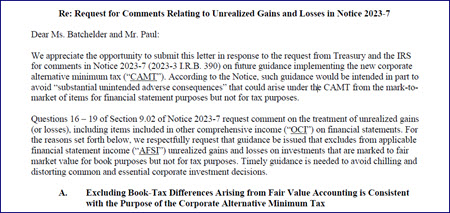
Congressional policymakers this week focused on two tax policy proposals included in President Biden’s FY2024 budget that could adversely affect family-owned real estate businesses—eliminating the step-up in the basis of assets at death and imposing new restrictions on the use of grantor retained annuity trusts (GRATs) and grantor trusts. (Roundtable Weekly, March 10 and Treasury’s “Green Book” description of the President’s revenue proposals, March 9)
Step-up in Basis
- The White House budget plan once again includes a proposal to eliminate the step-up in basis of real estate and other assets at death. The budget would replace step-up with a new policy that subjects the decedent’s appreciated assets to capital gains tax at death, in addition to potential estate tax liability. The tax on unrealized, built-in gains would apply even when the decedent and the heir have no intention or desire to sell the property.
- On Tuesday, a bipartisan group of Representatives led by Rep. Tracey Mann (R-KS) and Jim Costa (D-CA) introduced House Resolution 237 expressing support for retaining stepped-up basis. Cosponsored by 63 members of Congress (4 Dem., 58 Rep.), the resolution notes that stepped-up basis is “a crucial component of many family farms and small business succession plans.” (BGov and Rep. Mann news release, March 21)
- In 2021, a study by EY commissioned by the Family Business Estate Tax Coalition with support from The Real Estate Roundtable found that repealing stepped-up basis and taxing unrealized gains at death would result in reduced job growth, lower wages, and a reduction in GDP of roughly $10 billion per-year.
Grantor Trusts
- The President’s budget again proposes major tax increases on grantor retained annuity trusts (GRATs) and grantor trusts that the administration estimates would raise $65 billion over 10 years.
- GRATs and grantor trusts are frequently used to facilitate the continuation of family-owned businesses from one generation to the next, particularly in capital-intensive industries like real estate that can involve significantly appreciated assets.
- On Monday, four Democratic Senators—Elizabeth Warren (MA), Bernie Sanders (VT), Chris Van Hollen (MD), and Sheldon Whitehouse (RI)—wrote to Treasury Secretary Yellen urging her to use her regulatory authority to “limit the ultra-wealthy’s abuse of trusts to avoid paying taxes.” The letter includes eight specific recommendations, including the reissuance of family limited partnership regulations that address the use of valuation discounts. (Tax Notes, March 22)
- In 2017, The Real Estate Roundtable and others commissioned a study by Dr. Robert Shapiro, former Undersecretary of Commerce for Economic Affairs, analyzing the economic impact of a proposed regulation to limit valuation discounts for family businesses. The study concluded the limits could cost 106,000 jobs and $150 billion in GDP over 10 years. The study followed formal Roundtable written comments submitted in 2016—and oral testimony highly critical of the proposal by Roundtable Tax Policy Advisory Committee Member Stef Tucker.
The White House FY2024 budget revenue proposals will be discussed during the Roundtable’s Spring Meeting on April 24-25 in Washington, DC (Roundtable-level members only.)
# # #




 Tax provisions affecting individuals and small businesses originally enacted as part of the Tax Cuts and Jobs Act (TCJA) of 2017—along with the state and local tax (SALT) deduction cap—would be made permanent under legislation reintroduced this month by House Ways and Means Committee Vice Chairman Vern Buchanan (R-FL), above. (
Tax provisions affecting individuals and small businesses originally enacted as part of the Tax Cuts and Jobs Act (TCJA) of 2017—along with the state and local tax (SALT) deduction cap—would be made permanent under legislation reintroduced this month by House Ways and Means Committee Vice Chairman Vern Buchanan (R-FL), above. (








